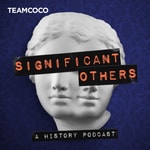The Book Review – Details, episodes & analysis
Podcast details
Technical and general information from the podcast's RSS feed.

The Book Review
The New York Times
Frequency: 1 episode/7d. Total Eps: 549

Recent rankings
Latest chart positions across Apple Podcasts and Spotify rankings.
Apple Podcasts
🇨🇦 Canada - books
27/07/2025#4🇨🇦 Canada - arts
27/07/2025#14🇬🇧 Great Britain - books
27/07/2025#11🇬🇧 Great Britain - arts
27/07/2025#39🇩🇪 Germany - books
27/07/2025#14🇩🇪 Germany - arts
27/07/2025#33🇺🇸 USA - books
27/07/2025#3🇺🇸 USA - arts
27/07/2025#7🇫🇷 France - books
27/07/2025#57🇨🇦 Canada - books
26/07/2025#4
Spotify
🇺🇸 USA - arts
27/07/2025#50↗
Shared links between episodes and podcasts
Links found in episode descriptions and other podcasts that share them.
See allRSS feed quality and score
Technical evaluation of the podcast's RSS feed quality and structure.
See allScore global : 53%
Publication history
Monthly episode publishing history over the past years.
21st Century Books Special Edition: Isabel Wilkerson on 'The Warmth of Other Suns'
Episode 497
lundi 26 août 2024 • Duration 39:12
As part of its recent "100 Best Books of the 21st Century" project, The New York Times Book Review is interviewing some of the authors whose books appeared on the list. This week, Isabel Wilkerson joins host Gilbert Cruz to discuss "The Warmth of Other Suns," her sweeping history of the movement of Black Americans from the south to points north over the course of the 20th century.
Book Club: 'My Brilliant Friend,' by Elena Ferrante
Episode 504
vendredi 23 août 2024 • Duration 50:56
This July, The New York Times Book Review published a list of The 100 Best Books of the 21st Century. The top choice was “My Brilliant Friend,” by Elena Ferrante, translated by Ann Goldstein.
The book is the first novel in Ferrante’s so-called Neapolitan quartet, which tracks the lifelong friendship between Lenù and Lila, two women from a rough neighborhood in Naples, Italy, even as family, relationships and work pull their lives in different directions.
In this week’s episode, MJ Franklin discusses the book with fellow editors Joumana Khatib, Emily Eakin and Gregory Cowles.
What It's Like to Write a King Arthur Tale
Episode 499
vendredi 19 juillet 2024 • Duration 32:46
Lev Grossman, author of fantasy novel "The Magicians" and its two sequels, joins host Gilbert Cruz to talk about writing his version of Camelot in "The Bright Sword: A Novel of King Arthur."
Sensing the World Anew Through Other Species
Episode 404
samedi 25 juin 2022 • Duration 45:53
Ed Yong’s new book, “An Immense World,” urges readers to break outside their “sensory bubble” to consider the unique ways that dogs, dolphins, mice and other animals experience their surroundings.
“I’ve often said that my beat is everything that is or was once alive, which covers billions of species, across basically the entirety of the planet’s history,” Yong says on this week’s podcast. “One thing I like about this particular topic — the sensory worlds of other animals — is that it, itself, though a singular, cohesive topic, is also the gateway to thousands of small wonders. There’s so much to learn about just in this one corner of biology.”
Terry Alford visits the podcast to talk about his new book, “In the Houses of Their Dead,” an investigation of how Abraham Lincoln, John Wilkes Booth and their families were influenced by spiritualism.
Alford says of Lincoln: “There’s a struggle, as best I see it, in him between the rational side and the side that desires to be comforted and to be in contact with someone you loved who’s not there anymore. He really wanted that, and he said he wanted that to a number of people. But he just felt, at the end of the day, that séance-type contact with the dead was really delusional.”
Also on this week’s episode, Lauren Christensen and Joumana Khatib talk about what they’ve been reading. John Williams is the host.
Here are the books discussed in this week’s “What We’re Reading”:
“The Secret History” by Donna Tartt
“Blood Orange Night” by Melissa Bond
“The Hack” by Wilfrid Sheed
We would love to hear your thoughts about this episode, and about the Book Review’s podcast in general. You can send them to [email protected].
Jackie, Before Marrying Jack
Episode 403
vendredi 17 juin 2022 • Duration 47:39
Elisabeth Egan, an editor at the Book Review, curates our Group Text column — a monthly choice of a book that she feels is particularly well suited to book clubs and their discussions. On this week’s podcast, she talks about her latest pick: “Jackie & Me,” by Louis Bayard, which imagines the friendship between Jacqueline Bouvier and Lem Billings, a close friend of the Kennedys.
“This is rooted in reality,” Egan says, “but Bayard runs with it and imagines conversations between Lem and Jackie, and just shows this, on one hand, fabulous life of parties and museums and fun they had together, but also sets up this ticking clock where you come to understand what Jackie really has at stake, and has to lose by committing to this life with the Kennedys.”
Matthew Schneier visits the podcast to discuss Paula Byrne’s new biography, “The Adventures of Miss Barbara Pym.” Pym, a British writer, began publishing novels in the 1950s.
“She published six novels in pretty quick succession, and they’re great,” Schneier says of the first decade or so of her career. “Very clever, very witty, she was often compared to Jane Austen — which was a writer that she loved and appreciated, but also a kind of very easy comparison, whereas Pym’s ironies can be a little bit darker than some of Austen’s. And there’s a sense in her work that she is spotlighting characters who are not the Emma Woodhouses, who are beautiful and rich and effervescent. They’re what she ended up calling ‘excellent women,’ which is the title of I think her best starter novel. These women who are well brought up and very proper, a little bit pious, but can also be a little dowdy, a little dreary, a little bit easier to overlook.”
Also on this week’s episode, Alexandra Alter talks about the filmmaker Werner Herzog and his first novel, “The Twilight World”; and Jennifer Szalai and Molly Young talk about books they’ve recently reviewed. John Williams is the host.
Here are the books discussed by The Times’s critics this week:
“The Facemaker” by Lindsey Fitzharris
“Meet Me by the Fountain” by Alexandra Lange
Tom Perrotta on the Return of Tracy Flick
Episode 402
vendredi 10 juin 2022 • Duration 52:22
Few fictional characters in recent decades have been as intensely discussed as Tracy Flick. The ambitious teenage protagonist of Tom Perrotta’s novel “Election” (1998) and the ensuing film adaptation, starring Reese Witherspoon, has been reconsidered in recent years as misunderstood and unfairly maligned. On this week’s podcast, Perrotta talks about Tracy’s return in his new novel, “Tracy Flick Can’t Win.”
“I think most people, when they think about Tracy Flick — I say this in all sad modesty — they’re thinking about Tracy in the movie,” Perrotta says. “‘Election’ as a book didn’t make a huge splash, and Reese Witherspoon’s performance was so powerful that I think the debate is really around Tracy in the film. And maybe to some degree me writing this book was an attempt to reclaim my own version of Tracy.”
Ann Leary visits the podcast to discuss her new novel, “The Foundling,” which was inspired by the real-life story of Leary’s grandmother, who worked, in the 1930s, at a public asylum that sequestered “unfit” women. Leary did a great deal of research for the book, and felt freedom in being able to bring it to bear in a work of fiction rather than history.
“I really wanted a story,” Leary says. “I could write about the widespread practice of eugenics, but I would have to kind of stick it to the place where my grandmother worked. And what I did in my novel was read about many other asylums, because there were many others. And I was able to make a fictitious place where I used things that I’d learned from the various different institutions.”
Also on this week’s episode, Alexandra Alter has news from the publishing world; and Gregory Cowles and Elizabeth Harris talk about what they’ve been reading. John Williams is the host.
Here are the books discussed in this week’s “What We’re Reading”:
“frank: sonnets” by Diane Seuss
“Life Between the Tides” by Adam Nicolson
“Saturday Night and Sunday Morning” by Alan Sillitoe
We would love to hear your thoughts about this episode, and about the Book Review’s podcast in general. You can send them to [email protected].
One Island, Two Men and Lots of Big Questions
Episode 401
vendredi 3 juin 2022 • Duration 53:24
Karen Jennings’s novel “An Island,” which was on the longlist for the Booker Prize in 2021, is set on a fictional unnamed island off the coast of Africa, where a man named Samuel has worked as a lighthouse keeper for more than 20 years. When a refugee washes up on shore one day, barely alive, Samuel navigates life around this stranger and flashes back to his own past, including his role in a political uprising and years that he spent in prison. On this week’s podcast, Jennings says that the book’s somewhat fable-like tone was very intentional.
“I knew that if I were to write about any one specific country, then I would have to make it about that country: that country’s political events, that country’s culture,” Jennings says. “My plan was to make it more universal, and attempt to understand something greater, something more complex. And the only way that I could see to do that was to do it in this very pared-down, focused way, reducing most of the action to this fictional island and then to these brief moments — I guess kind of like highlights — from Samuel’s past.”
Phil Klay, the Marine Corps veteran and acclaimed fiction writer, visits the podcast this week to talk about a new collection of his nonfiction writing, “Uncertain Ground: Citizenship in an Age of Endless, Invisible War.”
“There’s a huge problem when we’re regularly sending troops to kill people and sending troops at risk and the president is not forced on a regular basis to go before Congress to explain what the mission is, how it’s in the national interest, what it’s going to cost, what we’re trying to achieve,” Klay says. “I think that war is the most morally fraught thing we can do as a nation, and it demands more democratic accountability.”
Also on this week’s episode, Dwight Garner and Alexandra Jacobs talk about books they’ve recently reviewed. John Williams is the host.
Here are the books discussed by the Times’s critics this week:
“Phil” by Alan Shipnuck
“Here’s the Deal” by Kellyanne Conway
We would love to hear your thoughts about this episode, and about the Book Review’s podcast in general. You can send them to [email protected].
Remembering the ‘Great Stewardess Rebellion’
Episode 400
vendredi 27 mai 2022 • Duration 51:30
With current-day labor movements at Amazon, Starbucks and other big employers in the news, Nell McShane Wulfhart is on the podcast this week to discuss her new book about a vivid moment in labor history, “The Great Stewardess Rebellion: How Women Launched a Workplace Revolution at 30,000 Feet.” That revolution was launched in the face of working conditions that included contracts with onerous demands about every corner of a woman’s life.
“The age restrictions and the marriage restrictions and the pregnancy restrictions — obviously that was a big no-no — they had been part of the contracts for many years, I think for as long as stewardesses had been working,” Wulfhart says. “These restrictions were obviously designed to keep the work force as young as possible, as svelte as possible and as pliable as possible, because when you’re only working for a few years, you’re not that invested in getting better benefits or establishing a pension plan or fighting for your rights.”
James Kirchick visits the podcast to discuss his new book, “Secret City: The Hidden History of Gay Washington.” The sweeping story, from the days of the New Deal up through Bill Clinton’s presidency, considers the toll of homophobia in the nation’s capital.
“It’s incalculable,” Kirchick says. “The governmental resources that were expended in this, the hundreds of thousands of man hours that went into rooting out, discovering and firing patriotic civil servants. The deep wells of knowledge that were denied this country based upon fear of gay people. We don’t know those numbers. And then there’s of course the impact that it had on individual gay people.”
Also on this week’s episode, Lauren Christensen and Gregory Cowles talk about what they’ve been reading. John Williams is the host.
Here are the books discussed in this week’s “What We’re Reading”:
“Truth and Beauty” by Ann Patchett
“Fierce Attachments” by Vivian Gornick
“Role Models” by John Waters
We would love to hear your thoughts about this episode, and about the Book Review’s podcast in general. You can send them to [email protected].
Brian Morton on ‘Tasha: A Son’s Memoir’
Episode 399
vendredi 20 mai 2022 • Duration 36:07
Brian Morton, an accomplished novelist, has turned to nonfiction for the first time in his new book, “Tasha: A Son’s Memoir.” On this week’s podcast, he discusses his mother’s life, the difficulties in taking care of her toward the end of her life and what led him to write a memoir.
“I started writing a few pages about her, and I relished the freedom to write directly, to write without having to invent any characters,” Morton says. “I love to write about fictional characters, that’s my favorite part of writing. But it takes me a very long time to sort of give birth to them. And here was my mother, perhaps the most colorful character I’ve ever written about, who was right there to be written about.”
Rachel Careau visits the podcast to discuss her new translation of Colette’s “Chéri” and its sequel, “The End of Chéri.”
“One of the problems with her spare style is that the sentences can lack some of the words that usually oil a sentence,” Careau says of the task of translating the books. “So they can sound a little bit bare, sometimes a little syncopated. And the sound was very important to me, and I really let the sound guide me. But it’s difficult to make that bone-on-bone style flow.”
Also on this week’s episode, Lauren Christensen and Joumana Khatib talk about what they’ve been reading. John Williams is the host.
Here are the books discussed in this week’s “What We’re Reading”:
“Four Treasures of the Sky” by Jenny Tinghui Zhang
“The Last Samurai” by Helen DeWitt
“Independent People” by Halldor Laxness
We would love to hear your thoughts about this episode, and about the Book Review’s podcast in general. You can send them to [email protected].
John Waters Talks About His First Novel
Episode 398
vendredi 13 mai 2022 • Duration 33:23
The filmmaker, artist, author and general cultural icon John Waters visits the podcast this week to talk about his first novel, “Liarmouth: A Feel-Bad Romance.” The book features three generations of women in the Sprinkle family, and their very complicated (and antagonistic) relationships with one another. The first of them we meet is Marsha, an unrepentant thief and overall misanthrope; but Waters says he still wants us to root for her.
“She’s so crazy and so terrible that you can’t believe it at first,” Waters says. “And she’s quite serious about herself, as all fanatics are. No one in this book has much of a sense of humor about themselves, which, I think, can be played funny — the same way that when I made a movie, the main thing I told every actor was, ‘Never wink at the audience. Say it like you believe every single word.’”
Also on this week’s episode, Elizabeth Harris discusses the winners of this year’s Pulitzer Prizes; and Dwight Garner and Jennifer Szalai talk about books they’ve recently reviewed. John Williams is the host.
Here are the books discussed by The Times’s critics this week:
“Tacky” by Rax King
“The Last Days of Roger Federer” by Geoff Dyer
We would love to hear your thoughts about this episode, and about the Book Review’s podcast in general. You can send them to [email protected].









